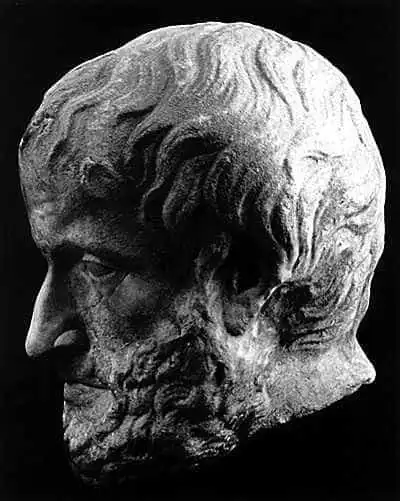FUNDAMENTALS |
BELIEFS A — Z |
|
INSPIRATION |
ENCYCLOPEDIA |
|
Prime Mover Aristotle. Life Energy FundamentalsThe MoverAncient speculations have mostly treated life as signified by movement. What moves may somehow be alive, but what moves of its own will is certainly a living creature. When that creature stops moving, it is no longer alive. So, many thinkers of old have wondered what makes us able to move.They did not seek the answer in anything like modern biochemistry or anatomy, since they could not imagine mechanical processes that give the illusion of a conscious will. Instead, they searched for how the conscious will could control and operate the body, which would otherwise be just a corpse, as still and non-responding as a rock. How could they think in any other way? They ordered their legs to move, and they walked. If they did not give the order, their legs would not take one single step. And why would their bodies walk at all, if there was no mind to tell them where to walk, and why? Homo rudis could perceive no other source to the body's movement than the mind, so the mind must be the originator. The mind was the mover, and the body was what moved. For that, the mind must have some kind of power by which to make the body move. Since movement was the expression of life, this power was a life force at the mind's disposal. There must be a life force at play in anything alive, and that force must be the very essence of life. If the mind was what exercised this life force, then the mind might be identical to it, in which case the mind was simply the will to move — somewhere, for something. Or the mind was separate from the force, commanding it, in which case the mind was in itself independent of it, and therefore neither alive nor dead, but simply otherworldly. When it ceased to move the body around, the mind went elsewhere, doing other things. Ancient humans pondered both these possibilities.
Prime MoverWhether the mind was identical to the life force, or something separate from it, the mind could not have come into existence later than the body did, since it was what gave the body meaning and life. The body must have appeared out of a purpose, because that was how it was brought to life, and the purpose could be nothing but the mind, since it was the mind that made use of the body.The body was a vessel for the mind, which governed it but was still completely dependent on it to reach its means. Aristotle (384-322 BC, see the image), the Greek philosopher who was so formidable at finding the root to any problem, regarded living beings as those who moved out of their own will. Still, he found them all to have been originally put in motion by a force, a will, outside their own, such as their parents giving birth to them. So, he wondered if there was a prime mover, one whose movements had not been initiated by someone or something else. Such a prime mover, then, would have been the one to commence also the movements that lacked a will of their own, like the planets in their orbits. We would call that prime mover god, but Aristotle was reluctant to speculate much more about the nature of this entity. Aristotle lived when the human civilization had progressed for quite a while. His questions, and some of his answers, had been put forth by people already many generations before his — though not always as sharply. The seemingly endless chain of generations was obvious also to Homo rudis. The cyclic nature of life, where each generation begets the next, was clear to see among humans as well as among any animals — also, though not that clearly, among plants. Primordial man must have wondered if there might have been a very first couple of the species. If so, how did they appear on Earth? What gave them life? It would be hard to fathom the human mind as the originator of itself, or of the life force as such. It made better sense to think of the life force as something separate from the mind, but put to use by it, like the body. Minds differed, but life and the ability to move did not. So it seemed plausible with a general life force for the individual minds to make use of. That life force, then, had to be as ever-present as the air each living creature inhaled and exhaled. Then, the life force might actually be the air, or something within it.
Next
About CookiesMy Other Websites
Qi Energy ExercisesThe ancient Chinese life energy qi (chi) explained and how to exercise it.
Creation MythsCreation stories from around the world, and the ancient cosmology they reveal.
Cosmos of the AncientsWhat the Greek philosophers believed about the cosmos, their religion and their gods.
TaoisticTaoism, the ancient Chinese philosophy of life explained. Also, the complete Tao Te Ching online.
Other Books of Mine
The Greek philosophers and what they thought about cosmology, myth, and the gods. Click the image to see the book at Amazon (paid link). |
 Life Energy Encyclopedia
Life Energy Encyclopedia Qi — Increase your life energy
Qi — Increase your life energy Cosmos of the Ancients
Cosmos of the Ancients Archetypes of Mythology
Archetypes of Mythology Tao Te Ching
Tao Te Ching Fake Lao Tzu Quotes
Fake Lao Tzu Quotes Stefan Stenudd
Stefan Stenudd